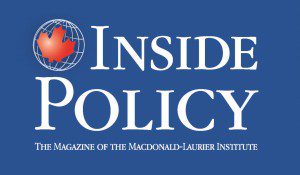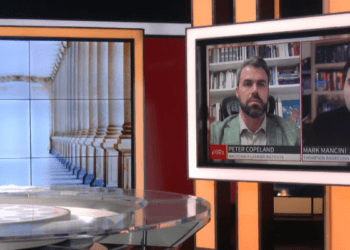In the new edition of Inside Policy, the magazine of the Macdonald-Laurier Institute, Christian Leuprecht argues for a greater emphasis on public safety to prevent a repeat of the terrorist attacks that rocked Canada earlier this fall – even if it means less of a focus on individual rights.
“The current equilibrium needs some rebalancing: If Canadian society and its courts can adapt – as jurisprudence in comparable rule-of-law jurisdictions has — then perhaps Canada may be able to do without expansive laws of detention, arrest and criminalization”, Leuprecht says.
By Christian Leuprecht, Dec. 16, 2014
Until October of this year, Canada had a first-rate batting average in thwarting attacks by homegrown terrorists on our soil: plots were few, people were charged, and, in many cases, convicted.
So, what went wrong this time? Michael Zehaf-Bibeau, who was responsible for the attacks in Ottawa that killed Cpl. Nathan Cirillo, and Martin Couture-Rouleau who killed Warrant Officer Patrice Vincent with his car during an attack in St-Jean-sur-Richelieu, Que., had both shown up on security intelligence radar. Both had prior convictions, struggled with mental health issues, and had known sympathies for politically-motivated violent extremism. Triangulated with other indicators, that put them at an increased risk of moving from thought to action.
Apparently, Canadian security services do not have difficulty identifying at-risk persons per se. Why are they not being detained? The current legal framework puts several measures at their disposal, including national security certificates, preventative arrest, and investigative hearings. Absent robust evidence that an individual is looking to move from thought to action, Canadian courts are reluctant to approve of detention, let alone convict.
The federal government appears to be looking at more expansive powers of detention, perhaps by clarifying conditions and criteria for detention. These are currently ill-defined in the criminal code and normally require evidence for detention to be presented to a judge within 24 hours. The government may extend the permissible period for detention to buy police and/or security intelligence additional time to gather the necessary evidence in the case of national-security investigations. Similar measures already exist in other allied countries; in the U.K., for instance, the period can be up to 28 days.
The government also appears to be looking at criminalizing association with or diffusion of discourse that incites politically-motivated violent extremism against Canada or Canadians. Similar measures already exist in other areas of law, such as those criminalizing the possession of child pornography or threatening someone else with violence.
Ultimately, though, these measures may not make much of a difference if the level of tolerance for the standard of evidence required to detain and possibly convict is not actually lowered. That is as much a matter of legal and societal culture than it is of law, per se. In Canada individual freedom, civil liberties and privacy persistently seem to trump individual and public safety. Ergo, the government is proposing to lower some thresholds for warrants, for instance, from reasonable grounds to reasonable suspicion.
Allies such as the UK, France, Germany, and Spain have had to learn to live with terrorism, some for decades. As a result, their courts and their societies have developed greater sensitivity towards the protection of public safety. “He who sacrifices freedom for security deserves neither,” Benjamin Franklin famously said. But what about he who sacrifices security for freedom? Freedom and security are not a zero-sum dichotomy; to the contrary, they are complementary: you cannot enjoy one without the other. However, you also cannot enjoy your freedoms if you are dead.
Unlike Americans, Canadians are not inherently skeptical and mistrusting of their government. Why, then, reduce the Charter to a mechanism to “protect” Canadians from government? In criminal law, we tend to convict after an act has occurred; anti-terrorism legislation, by contrast, is largely meant to deter individuals from moving from thought to action, and to prevent those who do from actually realizing their intentions. Canadian courts and Canadian society give the latter short shrift: the evidence that someone is looking to act needs to be overwhelming.
Tell that to the parents of Cpl. Nathan Cirillo; or the parents of Michael Zehaf-Bibeau and Martin Couture-Rouleau. All would have preferred for the courts to err on the side of caution. So would most of the critics of the government’s proposed legislative changes: If it was them or their child who was harmed, they would be chastising the government for not having done more.
CSIS appears to have great trouble convincing courts that some individuals should no longer be roaming freely; and the RCMP’s national security investigations are lengthy, in part because much of the evidence CSIS produces under the legal threshold of reasonable suspicion does not withstand scrutiny against the threshold of reasonable doubt in a criminal proceeding. With CSIS unable to detain and the RCMP evidently struggling to lay charges with the prospect of obtaining a conviction, are the courts too exacting?
The current equilibrium needs some rebalancing: If Canadian society and its courts can adapt – as jurisprudence in comparable rule-of-law jurisdictions has — then perhaps Canada may be able to do without expansive laws of detention, arrest and criminalization. I value my freedoms; but I value my life and the lives of my compatriots even more.
More expansive powers for law enforcement and security intelligence need to be balanced with robust parliamentary accountability. My preferred model is Belgium’s where two permanent agencies headed by judges – the Comité R (renseignement) and the Comité P (police) – are empowered to audit not only past but also ongoing investigations in real time and report their findings directly to a select group of security-cleared members of parliament.
But in the end, just as with child pornography or those who threaten to harm others, there comes an inflection point beyond which the protection of the collective interest enshrined in constitutional supremacy takes precedent over a denatured conception of individual rights. Michael Zehaf-Bibeau and Martin Couture-Rouleau were outliers; Parliament needs to assert its sovereignty to keep it that way.
Christian Leuprecht is Associate Dean and Associate Professor, Royal Military College of Canada and cross-appointed to Queen’s University.





